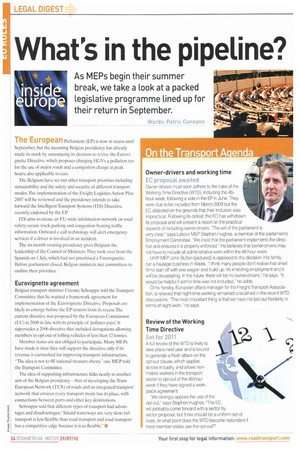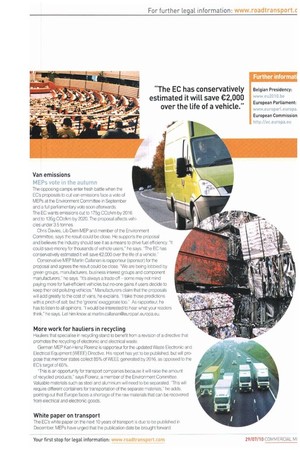Owner-drivers and working time EC proposal awaited
Page 24

Page 25

If you've noticed an error in this article please click here to report it so we can fix it.
Owner drivers must soon adhere to the rules of the Working Time Directive (WTD). including the 48hour week, following a vote in the EP in June. They were due to be included from March 2009 but the EC objected on the grounds that their inclusion was impractical. Following its defeat, the EC has vOthdrawn its proposal and will present a report on the practical aspects of including owner-drivers. "The will of the parliament is very clear," says Labour MEP Stephen Hughes, a member of the parliaments Employment Committee. ''We insist that the parliament implements the directive and ensures it is properly enforced." He believes that owner-drivers may not have to include all administrative work within the 48-hour week.
UKP MEP John Button (pictured) is opposed to the decision. His family run a haulage business in Wares. "I think many people don't realise that small firms start off with one wagon and build up. It's inhibiting employment and it will be devastating. In the future, there will be no owner-drivers," he says. "It would be helpful if admin time was not included," he adds.
Chris Yarstey, European affairs manager for the Freight Transport Association, is relieved that night-time working remained unscathed in the recent VVTD discussions. "The most important thing is that we have not lost our flexibility in terms of night work," he says.
Review of the Working Time Directive Set foc 2U11
A full review of the WM is likely to take place next year and is bound to generate a fresh attack on the opt-out clause, which applies across industry, and allows nonmobile workers in the transport sector to opt-out of the 48-hour week if they have signed a workplace agreement.
"We Strongly oppose the use of the opt-out,' says Stephen Hughes, "The EC will probably come forward with a sector by sector proposal, but there should be a uniform set of rules. At what point does the WTD become redundant if most member states use the opt-out?"
Van emissions MEPs vote to the autumn
The opposing camps enter fresh battle when the EC's proposals to cut van emissions face a vote of MEPs at the Environment Committee in September and a full parliamentary vote soon afterwards. The EC wants emissions cut to 175g CO2i1 Chris Davies, Lib Dern MEP and member of the Environment Committee, says the result could be close. He supports the proposal and believes the industry should see it as a means to drive fuel efficiency. "It could save money for thousands of vehicle users," he says. 'The EC has conservatively estimated it will save €2,000 over the life of a vehicle." Conservative MEP Marlin Callanan is rapporteur (sponsor) for the proposal and agrees the result could be close. "We are being lobbied by green groups, manufacturers, business interest groups and component manufacturers,'' he says. "It's always a trade-off some may not mind paying more for fuel-efficient vehicles but no-one gains if users decide to keep their old polluting vehicles." Manufacturers claim that the proposals will add greatly to the cost of vans, he explains. "I take those predictions with a pinch of salt, but the 'greens exaggerate too.' As rapporteur, he has to listen to all opinions. "I would be interested to hear what your readers think." he says. Let him know at martin.callanan@europarteuropaeu. More work for hauliers in recycling Hauliers that specialise in recycling stand to benefit from a revision of a directive that promotes the recycling of electronic and electrical waste. German MEP Karl-Heinz Florenz is rapporteur for the updated Waste Electronic and Electrical Equipment (WEEE) Directive. His report has yet to be published, but will propose that member states collect 85% of WEEE generated by 2016, as opposed to the EC's target of 65%. This is an opportunity for transport companies because it will raise the amount of recycled products," says Forenz, a member of the Environment Committee. Valuable materials such as steel and aluminium will need to be separated. "This will require different containers for transportation of the separate materials," he adds, pointing out that Europe faces a shortage of the raw materials that can be recovered from electrical and electronic goods. White paper on transport The EC's white paper on the next 10 years of transport is due to be published in December. MEPs have urged that the publication date be brought forward.Tags




























































































































